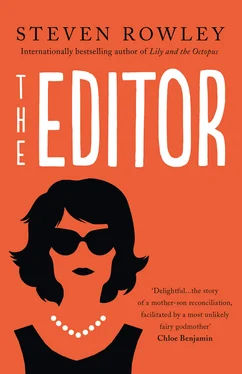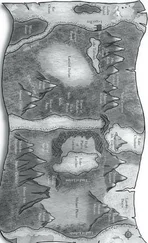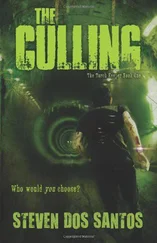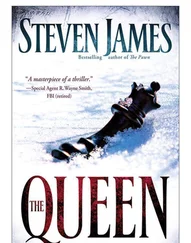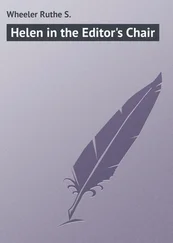I see Mrs. Onassis glance at the clock on the wall, and it’s obvious from that one small signal that our time is almost up.
“So.” It’s that awkward moment at the end of a first date. “What do we do now?”
She stands and offers her hand and I leap up to take it. We shake. I lean in, just a little bit, just enough to absorb her intoxicating presence a heartbeat longer; her hair smells like perfume and also, surprisingly, of cigarettes.
“Why don’t I have a conversation with your agent to work out the details. And then the hard work begins.”
I laugh nervously, realizing how difficult—crushing, even—it might be to hear real criticism, constructive though it may be, from this woman. When she lets go of my hand, I desperately try to think of anything to prolong this good-bye—clamber to name other mid-century heads of state and devise pressing questions about them. Alas, my mind roars only with the flat hum of an ocean, a momentous sound for a consequential occasion.
“We will be in touch.”
I open the conference room door for her, as any gentleman would, and as quickly as she entered my life she is gone.

THREE Chapter Three Chapter Four Chapter Five Chapter Six Chapter Seven Chapter Eight Go Your Own Way: July 1992 Chapter Nine Chapter Ten Chapter Eleven Chapter Twelve Chapter Thirteen Chapter Fourteen Yesterday’s Gone, Yesterday’s Gone: November 1992 Chapter Fifteen Chapter Sixteen Chapter Seventeen Chapter Eighteen Chapter Nineteen Chapter Twenty Chapter Twenty-One Chapter Twenty-Two Everything Turned Around: December 1992/1993 Chapter Twenty-Three Chapter Twenty-Four Chapter Twenty-Five Chapter Twenty-Six Chapter Twenty-Seven Chapter Twenty-Eight Chapter Twenty-Nine Chapter Thirty Chapter Thirty-One Chapter Thirty-Two Chapter Thirty-Three What Tomorrow Will Do: May 1994 Chapter Thirty-Four Chapter Thirty-Five Chapter Thirty-Six Acknowledgments About the Author Also by Steven Rowley About the Publisher

I manage to stay collected until I reach the bank of elevators, even though I can feel everyone’s eyes on me as I walk down the hall, back through the paper and push-pins and cubicles and past the framed book covers; I trip and pause only when it hits me that my cover will perhaps one day be among them. Miraculously, I get an elevator to myself for four floors, leaving just enough time for me to self-defibrillate before the doors reopen and three chatty coworkers enter the elevator and join me for the rest of the ride to the lobby, complaining the whole way about a new brand of powdered coffee creamer that leaves a residue in their mugs. I wonder if they have any idea what just happened. I’m curious if they can glimpse my secret, if they can smell it on me, my own residue, and the coffee-creamer conversation is a cover. I try to smell myself, to see if there is some trace of Jackie’s perfume, or, better yet, some faint whiff of American decorative arts from her White House restoration, leather or oils or fine upholstery. It occurs to me they think I’m crazy, a man in a corner with a stunned expression, smelling himself for any trace of 1962.
Does Jackie (surely she’s not Mrs. Onassis in my thoughts) drink office coffee with powdered creamer out of a foam cup—does she like it, or just choke it down to fit in? Does she talk about her weekend in dreamy terms (“How was your weekend, Mrs. Onassis?”; “Fine, I reframed the Chagall and then got some sun in Belize”)? Or is she just one of us, stretching her lunch breaks when spring is in the air, stealing uni-ball pens from the supply closet to use at home.
When the elevator reaches the ground floor I let the others off first, then push through the lobby and revolving door, almost forgetting to exit on Fifty-Second Street. The sharp February air enters my lungs and jolts me like a shot of ice-cold vodka. I line up in front of the first hot dog vendor I come to, even though I don’t eat hot dogs; when I get to the front of the line I pretend not to have my wallet and continue toward Times Square as I start to replay what just happened.
I lied to Jackie in our meeting, about how I came to write about my mother. Because it was a choice, even if I said it was desperation. We were once close—very close—and slowly as I grew older we were not. She blames me for the end of her marriage, for my father. She never said so explicitly, but honestly how could she not? My father was a difficult man, older, not just from another generation but from another time. He never knew what to make of me. He certainly didn’t approve of me, my sensitive nature, my creative ambitions, my wanting to live in the city, my insistence on being myself. He called me foppish once, and I think we both knew it was a placeholder for another derogatory f -word. My mother spent a lot of time running interference. I think she thought she was doing what was best—shielding me from him—but it cost my father and me any chance at a real relationship and she paid a price for it too.
I retreated into adolescence; a casual observer would say I was barely there as my parents’ relationship crumbled. But I was ever-present, lurking in the shadows, an aspiring writer already reading Tennessee Williams, fascinated by human behavior. I mastered the spell of invisibility, at least as much as a powder keg could. I knew instinctually I was the catalyst, the spark for the fury around me. I dimmed my light as long as I was able, but gunpowder is made to ignite—especially when that gunpowder is repressed teenage sexuality. The explosion was not something the three of us survived.
After they divorced, my mother withdrew and she became a mystery for me to unravel. A more patient son might have waited for this to self-correct. I could have led by example as I grew into the man I was meant to be, been a beacon for truth that somehow lit the way. But the more closed off she became, the louder the invitation was to unscramble her; I would pursue, she would retreat—it became an endless, vicious loop. Eventually I chose fiction as a way toward fact. It was inevitable that she would become my subject.
“I’m writing a book about Mom,” I remember telling my sister, Naomi, when I completed a particularly inspiring writing intensive. It was a three-day workshop and I came out feeling the time for a novel was now.
“Oh, God. Why?” was her response.
It was so obvious to me. “Have you met her? C’mon. Why not. ”
I thought I could show my mother how much I understood her, how grateful, in fact, I was for everything she had sacrificed for me. My brother Kenny told me there were certain questions about Mom that were just going to remain unanswered, and the sooner I accepted that, the happier I would be. He was able to make peace with it. Naomi was able to go about her life just fine. But a child wants to be close to his mother, and I was forever the baby. I think Kenny and Naomi felt that by not kicking the hornet’s nest, they would be just close enough. Not so for me.
I started writing and I didn’t stop. I was obsessive, writing for an audience of one. I stayed up nights, wrote through lunch breaks, and canceled plans with friends. Daniel had to remind me to eat, and even at times to sleep. Nine months later, right on cue, I delivered a novel I called The Book of Ruth , after the mother character, despite the heavy-handed allusion to the Hebrew text. Because of the Jane Hamilton novel I settled on a new title, The Quarantine , after the self-imposed isolation (literal and figurative) at the heart of the book.
Читать дальше
